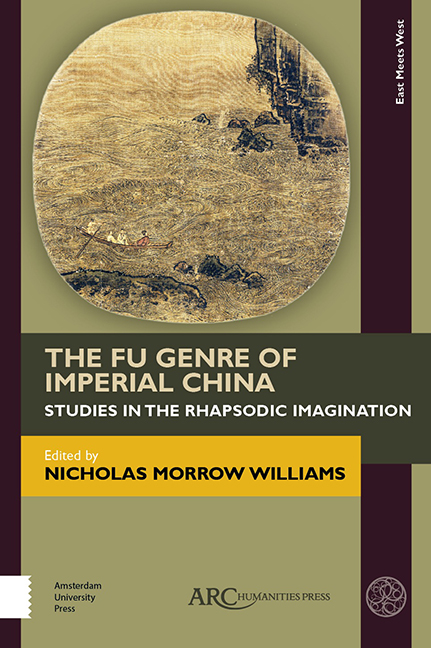1 - Introduction: The Rhapsodic Imagination
Published online by Cambridge University Press: 20 November 2020
Summary
THE FU 賦 is a major genre of Chinese literature, intricately involved with the society and culture of imperial China from the Han through the Qing dynasties. It is a poetic form of tireless ambition that has been used for exhaustive descriptions of cities and palaces, as well as private reflections and lamentations, but also for carefully modulated political protest and esoteric ruminations on philosophical subtleties. Though no English term even approximates it, “rhapsody” at least suggests the energy and recitative origins of the fu. But the particular imaginative scope of the fu is unique to Chinese literature; it has been the tool of choice for Chinese poets aiming to articulate the features of the greatest cities and the tiniest insects. In politics, the fu has been the definitive genre by which to narrate the ruin of dynasties, or to counsel against the sins that incur the ruin. Whether political, astronomical, geographical, zoological, mineral, botanical, historical, metaphysical, anthropological, or horticultural, every field of learning about the exterior world lay within the scope of the rhapsodic imagination. This volume seeks to illustrate and interpret some of the key aspects of the fu genre throughout the history of imperial China, as one of the primary means by which Chinese writers limned the very limits of their universe and portrayed its diverse contents.
Various tools of literary criticism or historical analysis could be used to examine it, but first and foremost fu should be seen as a variety of Chinese poetry. This approach follows the lead of the great historian and poet Ban Gu 班固 (32– 92), who opened his magisterial composition on the “Two Capitals” 兩都賦 with the assertion that: “It has been said that the fu is a derivation from the ancient Songs.” Ban Gu was relating this genre to the Shijing 詩經, the classic anthology of poems supposedly edited by Confucius, and this filiation has the effect of placing it squarely in the main tradition of Chinese poetry. Moreover, since “Two Capitals” was chosen as the first piece in the supreme anthology of early medieval literature, the Wen xuan 文選, this sentence would also open that anthology and define the status of the fu for ages to come.
- Type
- Chapter
- Information
- The Fu Genre of Imperial ChinaStudies in the Rhapsodic Imagination, pp. 1 - 16Publisher: Amsterdam University PressPrint publication year: 2019



